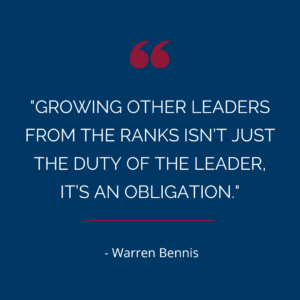We often talk about the importance of a business owner working to make their business less dependent on them. Let’s face it, the entrepreneurial personality is frequently very self-driven, and enjoys controlling their own destiny.

In the beginning, often the business IS the owner. The owner wears numerous hats and takes on the majority of responsibility for all facets of the business. This owner does the hiring, firing, banking, drives sales, production, purchasing, AND changes the lightbulbs! When customers call, they all want to speak with the owner. When a supplier relationship is identified and negotiated, it's done by the owner. The owner establishes and maintains a business banking relationship. Payroll is processed and reviewed by the owner and no one but the owner sees the financial statements.
While this might be what it takes early on, if the day-to-day management of the company were to continue like this, the business would be headed for trouble because the business cannot survive long-term without the personal day-to-day involvement of the owner.
Fast forward 30 years and the business has grown, with a significant number of employees working out of what is an expanded, new, or possibly an additional facility. The question is, how much of the business’s operations have been shared and/or delegated to other team members representing a management team? The ultimate litmus test is whether the business’s operations can continue if the owner leaves for a 2-week vacation, better yet a 4-week vacation, and only call in to say hello.
This point of over reliance on the owner is so important that it is one of the qualitative factors that is considered during our business valuation process. A business too dependent on the owner has lower value.
The truth of it is, the years go by quickly and a business that runs with a philosophy of “this is how it’s always been done” as compared to one that prepares for succession by running independently of the owner and building a sustainable business model, results in the difference between a business that is maximizing the owner’s wealth and one that is scrambling to figure out how the owner can ever transition the company to a new owner(s).
How does an owner work to create a business that is not dependent on them?
- 1. Hire and keep qualified employees in order to build an experienced management team.
- Consider hiring a chief operating officer and give him/her the time to learn the company and to take over its management. Many times this alone is useful in identifying potential areas of improvement that need to be investigated that are possibly missed by the owner due to their years in the ‘trenches’ - and possible lack of energy to tackle such issues.
- Compensate competitively: Consult with industry compensation experts—how is compensation structured? What is included in a meaningful benefits package?
- Be open to considering different ways of working such as flexible hours/days; remote offices or hybrid.
- Focus on building a strong culture and connection among all employees, thereby reducing turnover.
- Educate and inspire personal growth.
- Train in a consistent manner and cross train to avoid tribal knowledge.
- 2. Shadow the owner—include one or more team members in all client meetings and communications. The same is true for vendor relations.
- 3. Include the management team in all strategic and business planning sessions, making sure to identify goals, tactics and how success will be measured.
- 4. Share financial goals and results or, at a minimum, develop KPI’s—key performance indicators—that are shared regularly with the management team.
- 5. Document systems and processes that are key to the business. This is valuable for making sure the business is not dependent upon the owner but can also reduce dependency on key employees who may have processes “in their heads.”
- 6. Tracking business processes from beginning to end may well identify inefficiencies and /or opportunities for improvement.
- 7. Delegate, delegate, delegate. If the company’s training procedures are working, the owner should not be the person solving the day-to-day problems. Encourage others to solve issues on their own.
- 8. Engage Advisors - Consider developing an outside board of directors or advisors with expertise in ownership succession to help focus on appropriate succession and ongoing management issues.
Building and engaging trusted employees and a management team is important for many reasons, from the owner’s ability to sell the business to the business’s valuation conclusion, and more. To learn about other qualitative and quantitative factors we consider when valuing a business, read more here.
As always, our team is here to answer questions you may have around business valuation for privately held businesses. We are happy to have a complimentary initial conversation to discuss what the valuation process entails and how to get started. CapVal offers traditional comprehensive business valuation options as well as our Business Trend Analysis + Valuation (BTA+V) web-based software that allows you to obtain a reliable value conclusion for business planning purposes at your desk, on your schedule.
If you would like to discuss a specific business situation please reach out to us through the Contact page or call us at 608-257-2757 and we’ll connect you to a business valuation expert on our team.

